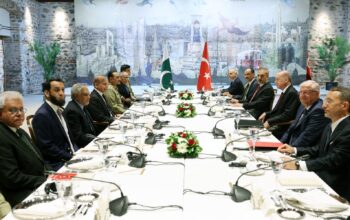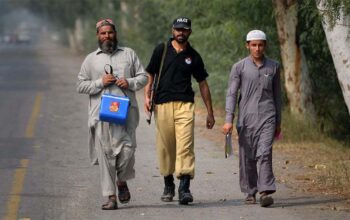By Staff Reporter
ISLAMABAD: Former prime minister Imran Khan, who is serving a three-year prison term for corruption, announced on Wednesday that he would run in the general elections scheduled for Feb. 8, defying legal hurdles and political pressure.
Khan, who led the Pakistan Tehreek-e-Insaf party to power in 2018, was convicted in August of illegally profiting from the sale of state gifts he received during his tenure. Under the law, convicts are barred from holding public office for five years, effectively disqualifying Khan from the upcoming polls.
But Khan has challenged his conviction in the Islamabad High Court, seeking a suspension of his sentence and bail. The court has not yet issued a verdict on his appeal, leaving his political fate uncertain.
Khan also faces several other legal cases, including one in which he is accused of leaking official secrets, a charge that carries a possible death penalty.
Khan, a former cricket star who became a popular politician, rose to power on an anti-corruption platform, promising to create a “new Pakistan” that would be free of graft, nepotism, and dynastic politics. But his government soon faced criticism for its handling of the economy, political opponents, and foreign relations.
He won the last general election in 2018, a victory that his opponents say was achieved with the backing of the military. Khan and the military later fell out, mainly because of differences over the appointment of the chief of the main spy agency. He was ousted in a parliamentary vote of no confidence in April 2022.
Despite the odds, Khan’s party said he would contest the elections from three constituencies: Mianwali, his ancestral hometown; Lahore, the capital of Punjab province and a political stronghold; and Islamabad, the federal capital.
“Tomorrow Khan Sahib will get the nomination forms and he will contest these elections,” Gohar Khan, the chairman of the PTI, told reporters. “Khan sahib will contest these polls, God willing.”
The party said it hoped the Islamabad High Court would soon announce a favorable verdict on his appeal and allow him to run for office.
“We hope that the judgment will soon be announced because the [election] schedule has been released,” Ali Zafar, a lawyer on Khan’s legal team, said.
The PTI also said it would field other party leaders and supporters who were in jail on various charges, claiming that they were victims of political victimization by the opposition parties and the establishment.
“The rest of the candidates have also been finalized and their names will be announced soon,” Zafar added.
The party also accused the authorities of creating hurdles in the submission of nomination papers, saying that some of its candidates had their papers snatched by unidentified men on the streets.
“Snatching nomination papers from people on the street would make these elections a shame,” Gohar Khan said. “We want elections to be held on February 8 at any cost.”
The PTI also said it was filing petitions in all high courts to seek executive orders to ensure a smooth and fair electoral process.
Latif Khosa, a senior PTI leader and lawyer, said the party’s opponents were afraid of facing Khan and his party in the elections.
“The time for banning any party has passed and finished. Banning does not come under the executive’s domain,” he said. “They are still scared of Khan sahib.”
Pakistan gears up for elections
Meanwhile, the election commission has started accepting nomination papers from candidates vying for 859 national and provincial assembly seats, as the country gears up for a general election on Feb. 8.
More than 128.5 million registered voters, including nearly 60 million women, will cast their ballots to choose among 175 political and religious parties, according to the latest data from the Election Commission of Pakistan (ECP).
The ECP has set a tight schedule for the nomination process, which will end on Dec. 22. The names of all nominated candidates will be published on Dec. 23, followed by a scrutiny period of six days.
Candidates can file appeals against the decisions of the returning officers, who are responsible for overseeing the electoral process in each constituency, by Jan. 3. The appeals will be decided by an appellate tribunal by Jan. 10.
The ECP will publish the revised list of candidates on Jan. 11, and the last date for withdrawal of candidature and publication of the final list of candidates is Jan. 12. The ECP will allot election symbols to contesting candidates on Jan. 13.
The election program also applies to the seats reserved for women and non-Muslims in the national and provincial assemblies, for which candidates have to submit a separate priority list by Dec. 22.
The fee for obtaining a nomination form is Rs10 ($0.06), and each candidate can submit up to five nomination papers with different proposers and seconders. The fee for a national assembly seat is Rs30,000 and for a provincial assembly seat is Rs20,000, which is non-refundable.
Nomination papers have to be submitted with attested copies of computerized national identity cards, vote certificates, income tax returns, and passports of the candidates and their supporters.
To be eligible for contesting, a candidate has to be a Pakistani citizen, at least 25 years old, and a registered voter in any part of the country for the national assembly and of the province for the provincial assembly.
Candidates for the women’s reserved seats have to be registered voters of the province they are representing and meet the criteria specified in the constitution, which include being “sagacious, righteous and non-profligate, honest and ameen”.
The proposers and seconders of candidates for the general seats have to be voters of the same constituency.
Pakistan’s parliament consists of 342 members in the national assembly, of which 272 are directly elected, 60 are reserved for women and 10 for non-Muslims. The provincial assemblies have a total of 517 seats, of which 297 are directly elected, 66 are reserved for women and 18 for non-Muslims.
Copyright © 2021 Independent Pakistan | All rights reserved




